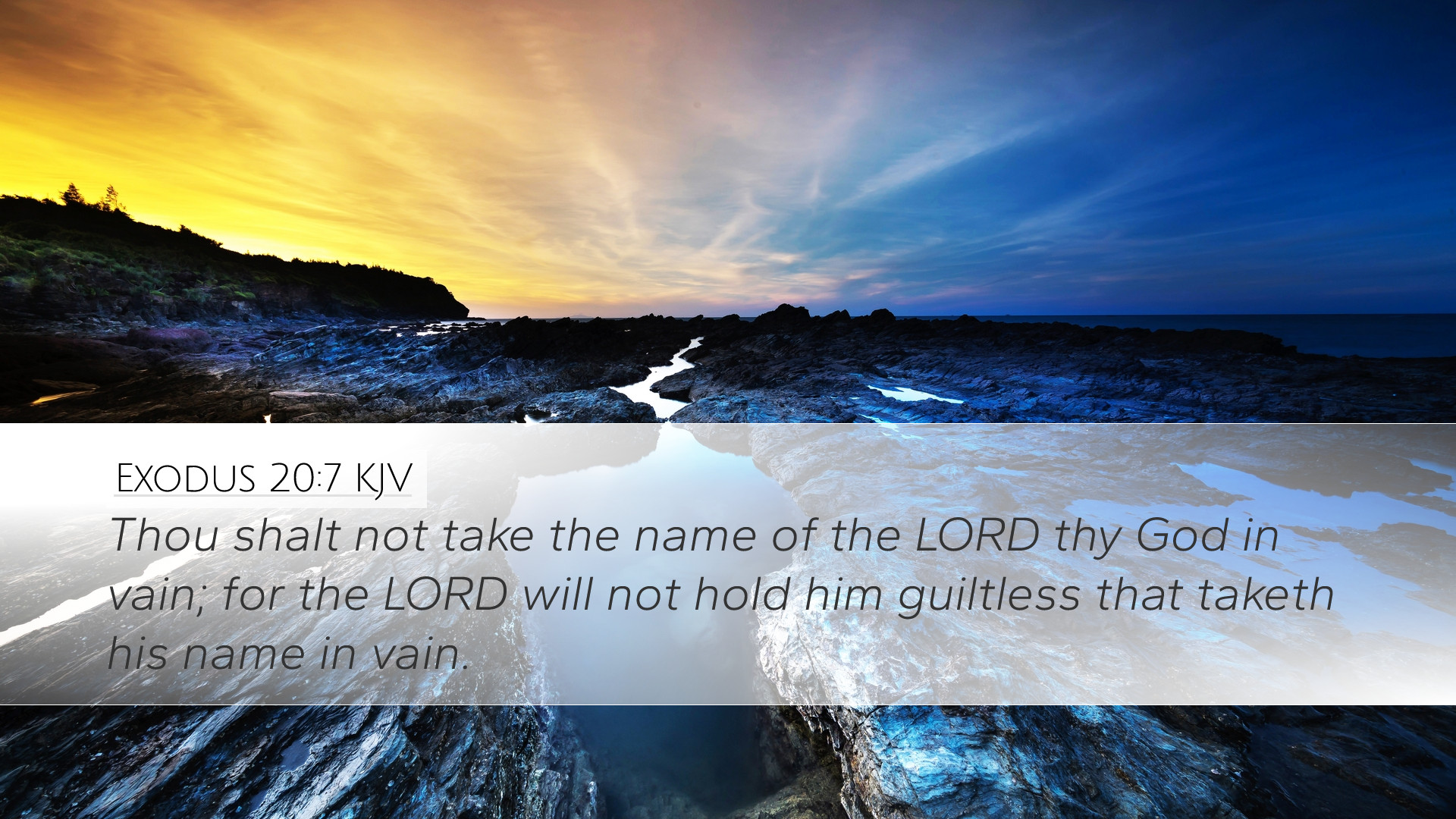Commentary on Exodus 20:7
Text of Exodus 20:7: "You shall not take the name of the LORD your God in vain, for the LORD will not hold him guiltless who takes his name in vain." (ESV)
Introduction
The third commandment, as presented in Exodus 20:7, addresses the sanctity and profound significance of God’s name. This commandment serves as a reminder of the seriousness with which one must regard God and His attributes. It functions both as a warning and a call to respect God's holiness.
Theological Implications
Understanding the Name of God:
To “take the name of the LORD your God in vain” implies misusing or disrespecting it. As Matthew Henry notes, the name of God encompasses His character, nature, and authority. It signifies not just His title but the essence of who He is. Hence, this commandment underscores the reverence owed to God's holy name.
Importance of Reverence:
According to Albert Barnes, reverence for God's name reflects a recognition of His sovereignty and holiness. The commandment emphasizes that God’s name represents His covenant with His people, and treating it lightly can lead to dire spiritual consequences. The character of God warrants respect; thus, misusing His name is tantamount to undermining His authority.
Exegesis of the Commandment
1. Meaning of “In Vain”
To act “in vain” is to act without respect for the sacred. Adam Clarke elaborates that this includes false swearing, trivial usage, and any expression that diminishes God's holiness. It is crucial to establish a distinction between casual mentions of God's name and invoking it in a manner that asserts reverence and truthfulness.
2. Contextual Considerations
The commandment is situated within the broader context of the Decalogue, highlighting the covenantal relationship between God and the Israelites. This relationship demands fidelity, and respect for His name is an aspect of that fidelity. Henry observes that taking God's name in vain often leads to a lack of commitment to the covenant inherent in one's relationship with Him.
3. Consequences of Misusing God’s Name
The latter part of the command states that God "will not hold him guiltless who takes his name in vain." This pronouncement serves as a solemn warning about the consequences of negligence concerning God's name. Both Barnes and Clarke emphasize that this refers not only to individual guilt but also to a broader societal impact of disrespecting God's character. It reflects a moral and spiritual accountability that extends beyond personal actions.
Practical Applications
1. Importance of Intentional Speech:
This commandment invites believers to engage in careful speech and thought. Pastors and theologians are challenged to encourage their congregations to speak of God with gravity and intention, understanding the implications such words carry in their spiritual lives and communities.
2. The Role of Worship:
Worship, when authentic, reflects an understanding of God’s holiness. As worship leaders craft liturgies, prayer, and song, they must be mindful that every invocation of God’s name serves to elevate His majesty rather than diminish it through flippancy or casualness.
3. Teaching Respect:
Educators and parents are called to teach the weightiness of God’s name to younger generations. Teaching children to understand the significance of reverence for God can shape their spiritual identity and relationship with Him.
Contemporary Issues
In an era where casual discourse often spills over into realms once considered sacred, the third commandment has pressing relevance. Clarke points out how contemporary entertainment and media frequently banalize spiritual concepts, leading to a gradual erosion of reverence for God. Pastors are encouraged to address these cultural trends with wisdom, calling congregants back to a more respectful and awe-filled understanding of God.
Conclusion
Exodus 20:7 is not merely a prohibition; it is an affirmation of the gravity and importance of God’s name in the life of faith. The insights drawn from public domain commentaries highlight the necessity for reverence, intentionality, and integrity in how believers invoke and represent God's name. In understanding and embodying this commandment, the faithful can cultivate a deeper relationship with God and foster a culture of respect and honor toward His divine majesty.
Reflection Questions
- In what practical ways can you ensure the sanctity of God's name in your life?
- How does understanding the holiness of God's name influence your worship and witness?
- What steps can be taken in your community to promote a greater reverence for God’s name and character?


